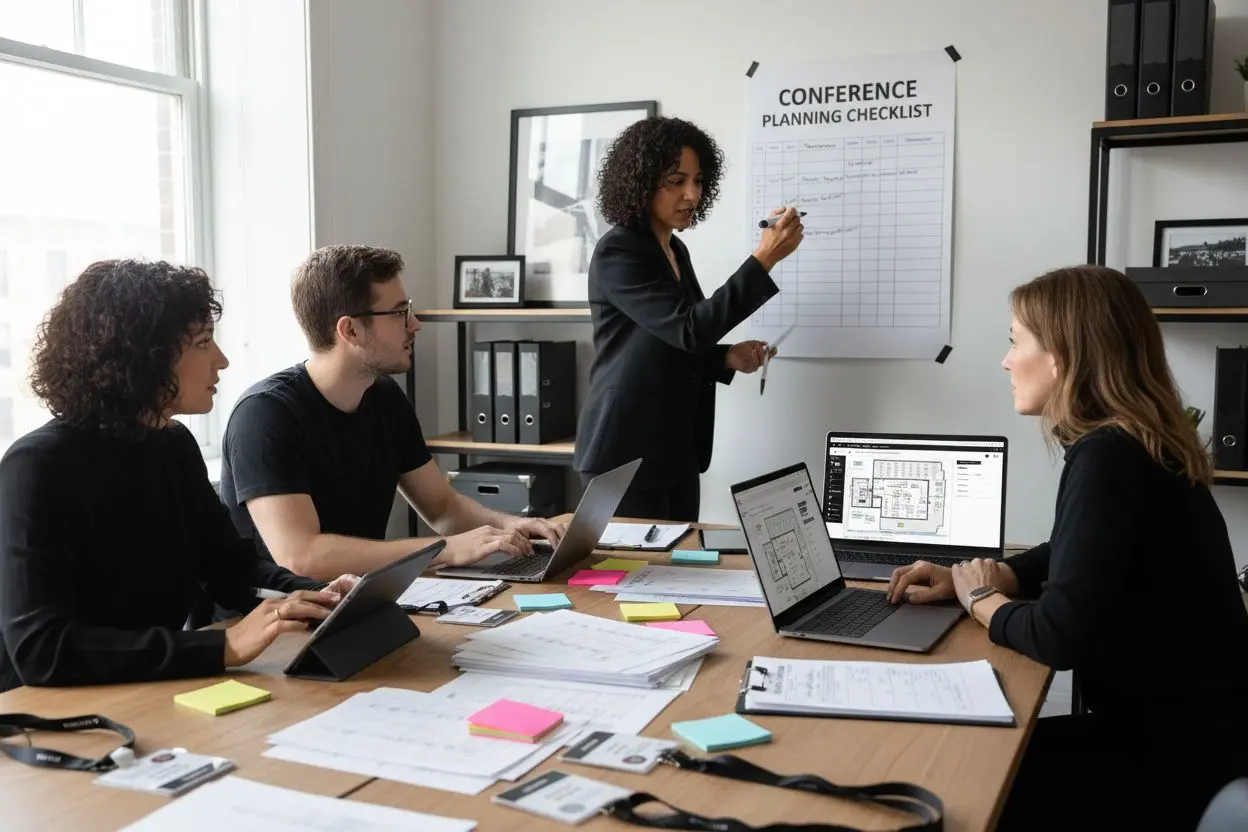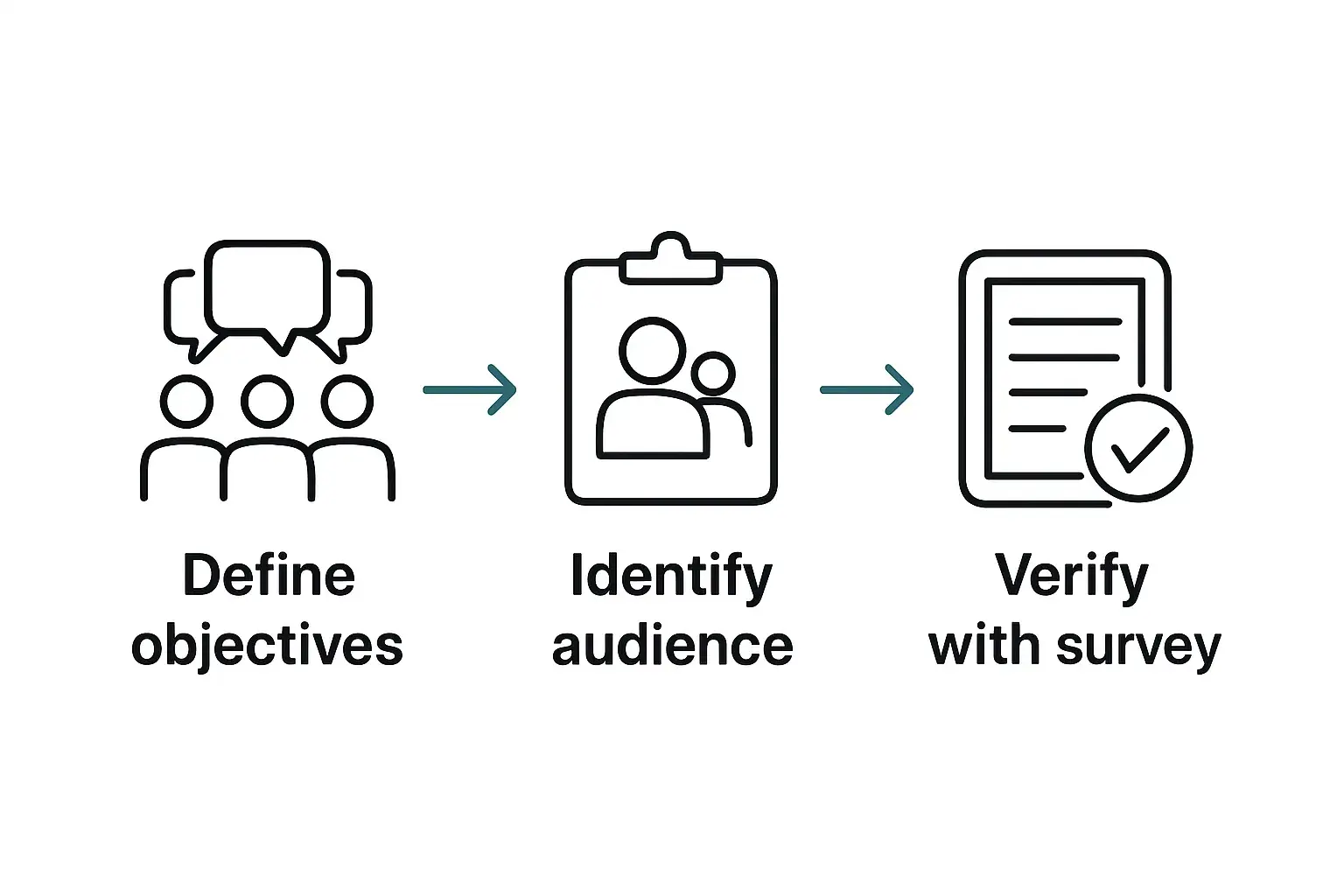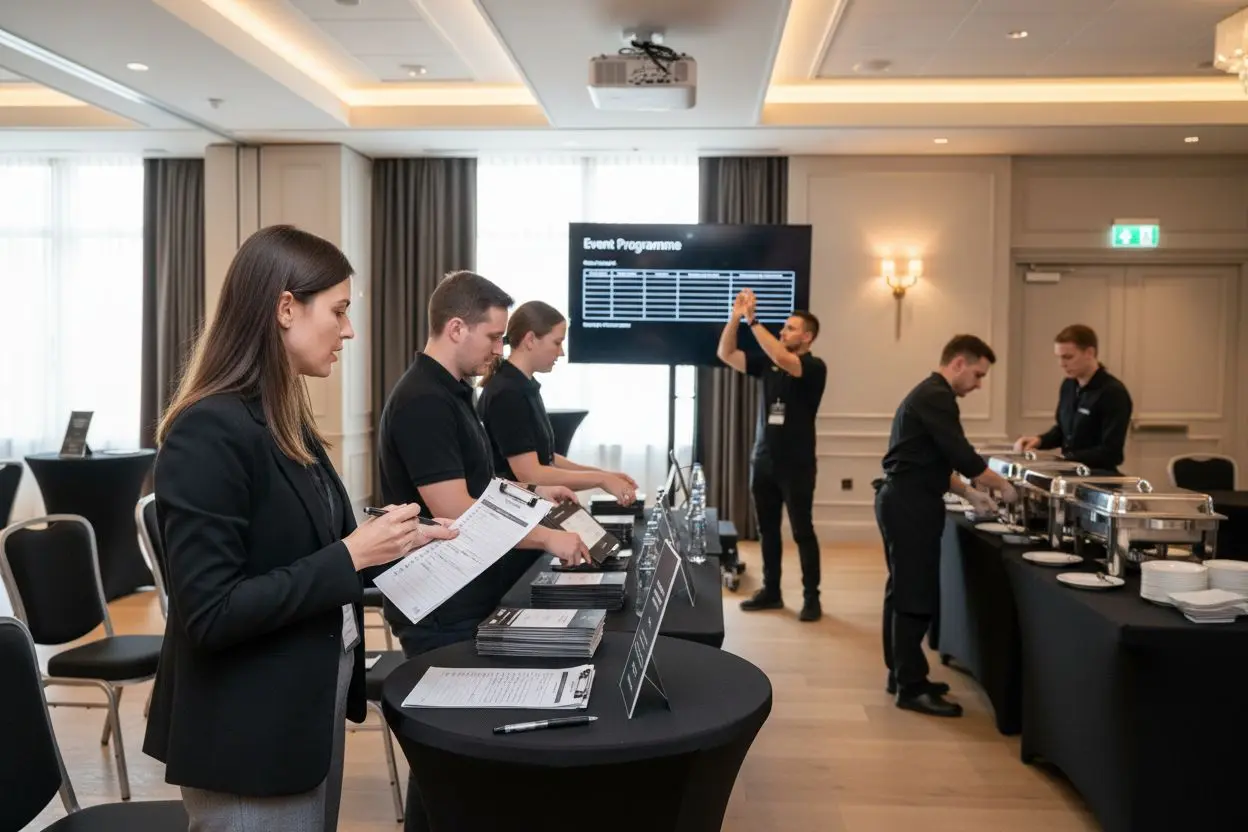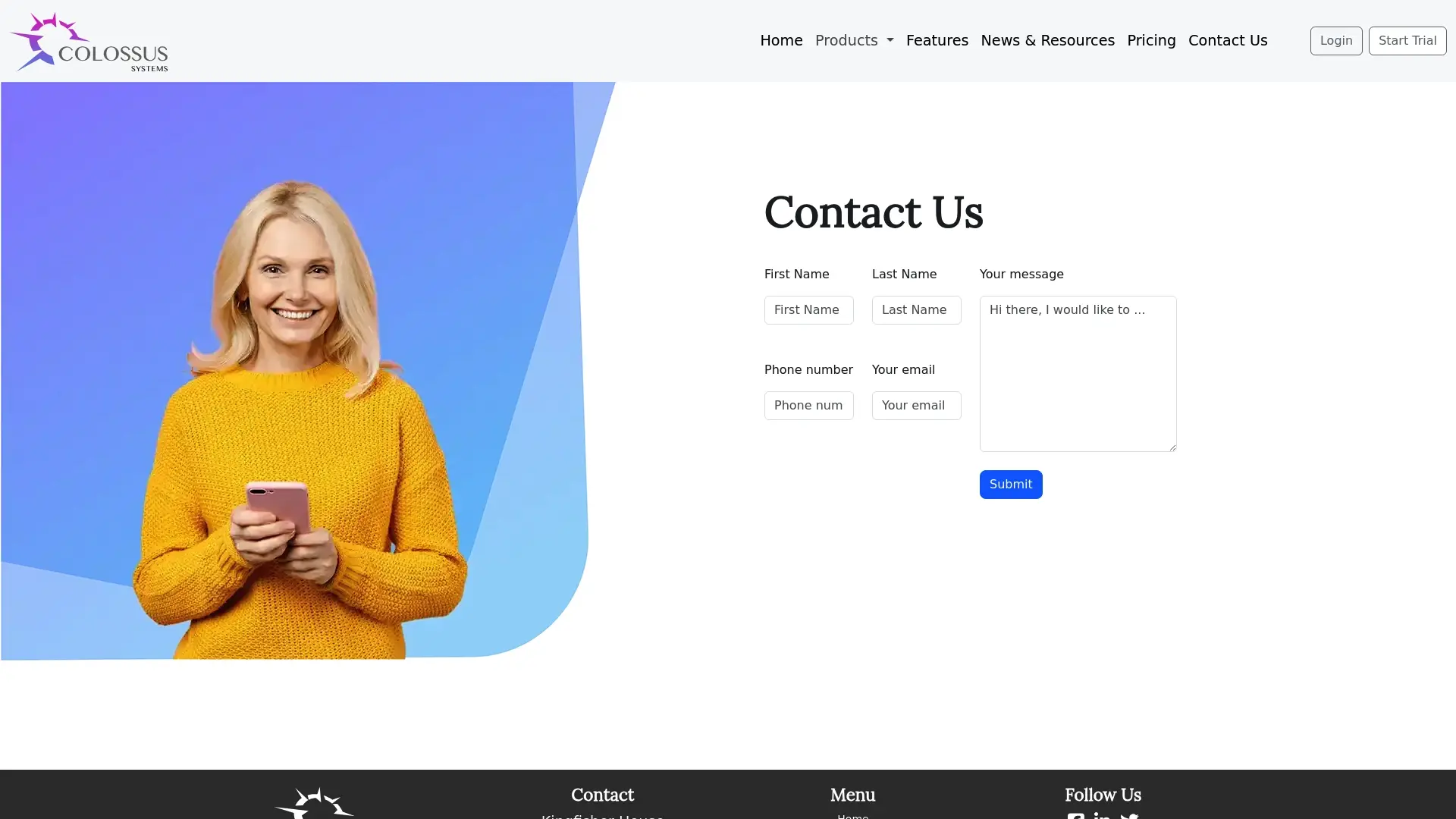Complete Conference Planning Checklist for Successful Events

Planning a conference can feel overwhelming, especially with so many moving parts and expectations. Yet the real surprise is just how much control you actually have over its success. Professional conference planners recommend allocating up to 40 percent of the budget to the venue alone, which means the smallest decisions can make the biggest impact. What most people miss is that every detail, from defining your objectives to gathering feedback, builds the foundation for an event people will remember for years.
Table of Contents
- Step 1: Define Conference Objectives And Target Audience
- Step 2: Establish A Budget And Allocate Resources
- Step 3: Select Venue And Secure Necessary Services
- Step 4: Develop A Comprehensive Event Programme
- Step 5: Promote The Conference And Manage Registrations
- Step 6: Evaluate The Event And Gather Feedback For Future Improvements
Quick Summary
| Key Point | Explanation |
|---|---|
| 1. Clearly define objectives and audience | Articulate precise goals and profile participants to ensure the event meets their needs. |
| 2. Create a detailed budget plan | Identify all potential expenses and revenue sources to manage finances effectively. |
| 3. Select an accessible and equipped venue | Ensure the venue meets technical and logistical requirements to enhance participant experience. |
| 4. Develop a diverse and engaging programme | Include various formats and expert speakers to cater to different learning styles and interests. |
| 5. Implement effective marketing and registration | Use targeted digital strategies to attract participants and streamline the registration process. |
Step 1: Define conference objectives and target audience
Successful conference planning begins with crystal clear objectives and a well-defined target audience. This foundational step determines the entire trajectory of your event, influencing everything from marketing strategies to content selection and venue choice.
Start by conducting a strategic brainstorming session with key stakeholders to articulate the precise goals of your conference. Are you aiming to educate industry professionals, facilitate networking opportunities, launch new research, or generate business leads? Each objective will significantly shape your event’s design and execution. Consider both qualitative and quantitative outcomes you want to achieve. For instance, a medical conference might aim to share cutting-edge research findings while simultaneously providing continuing professional development credits for attendees.
Understanding your target audience requires comprehensive demographic and professional profiling. Research the specific characteristics of potential participants including their career stages, professional interests, geographical locations, and learning preferences. This detailed audience analysis helps you craft a conference experience that resonates deeply with participants. Professional associations, industry reports, and membership databases can provide invaluable insights into your potential attendees.
Your audience research should explore critical questions: What knowledge gaps exist in your professional community? What challenges are professionals currently experiencing? What type of learning formats do they prefer - panel discussions, workshops, keynote speeches, or interactive sessions? By answering these questions, you create a conference that feels precisely tailored to your audience’s needs.

Verify your objectives and audience understanding through preliminary surveys or focus group discussions. Read our guide on increasing event attendance to refine your participant targeting strategy. A well-defined conference objective coupled with a meticulously researched target audience sets the stage for an impactful, meaningful event that delivers genuine value to participants.
Step 2: Establish a budget and allocate resources
Budget planning is the financial backbone of any successful conference, transforming strategic objectives into a realistic financial framework. This critical step requires meticulous attention to detail and a comprehensive understanding of potential expenses and revenue streams.
Begin by creating a detailed financial breakdown that accounts for every potential expenditure. Major budget categories include venue costs, speaker fees, marketing expenses, technology infrastructure, catering, and administrative overhead. Professional conference planners recommend allocating approximately 30-40% of your total budget to venue and logistical requirements, with another 20-25% dedicated to speaker and content development.
Research industry benchmark data to understand typical cost structures for conferences similar to yours. Some expenses might surprise you - for instance, audiovisual equipment and technical support can consume up to 15% of your total budget. Consider potential revenue sources beyond ticket sales, such as sponsorships, exhibitor fees, and potential grants or institutional support.
Develop a contingency fund representing 10-15% of your total budget to manage unexpected expenses. This financial buffer provides flexibility and prevents potential planning disruptions. Use spreadsheet tools like Excel or specialised event management software to track expenses meticulously. Our guide on hosting virtual conferences offers additional insights into technology-related budgeting considerations.
Consider negotiating package deals with vendors and exploring early booking discounts. Many conference venues and service providers offer reduced rates for advance commitments. Be transparent about your budget constraints while maintaining professional expectations. Request detailed quotes from multiple vendors to ensure competitive pricing and comprehensive service offerings.
Verify your budget’s completeness by conducting a final review with key stakeholders. Confirm that all anticipated expenses are documented, potential revenue streams are explored, and a realistic financial plan supports your conference objectives. A well-structured budget not only prevents financial strain but also provides a clear roadmap for successful event execution.
Below is a table summarising key budget categories and recommended allocation percentages, helping you to structure your conference budget based on industry best practices.
| Budget Category | Recommended Allocation (%) | Key Considerations |
|---|---|---|
| Venue & Logistics | 30-40 | Includes venue hire, facilities, and basic services |
| Speaker Fees & Content | 20-25 | Covers honouraria, travel, and materials |
| Technology & AV | Up to 15 | Audiovisual, Wi-Fi, technical support |
| Catering | Variable | Meals, refreshments, dietary requirements |
| Marketing | Variable | Promotion, digital marketing, printed materials |
| Administration | Variable | Staff, registration, insurance, supplies |
| Contingency Fund | 10-15 | Buffer for unexpected expenses |
Step 3: Select venue and secure necessary services
Selecting the right venue and securing essential services transforms your conference planning from conceptual to tangible. This pivotal step requires strategic evaluation of multiple factors that directly impact participant experience and event success.
Location accessibility and infrastructure should be your primary considerations. Evaluate potential venues based on geographical convenience for your target audience, proximity to transportation hubs, parking availability, and technological capabilities. Consider whether your conference requires a traditional conference centre, hotel conference space, university facility, or potentially a hybrid virtual environment.
Technological infrastructure demands careful scrutiny. Modern conferences require robust internet connectivity, comprehensive audiovisual equipment, reliable power sources, and flexible space configurations. Conduct thorough site inspections to verify technical specifications match your event requirements. Confirm the venue offers dedicated technical support staff who can troubleshoot potential connectivity or equipment challenges during your conference.
Service procurement extends beyond physical space. Catering, audiovisual support, registration management, and potential accommodation arrangements require meticulous negotiation. Request comprehensive service packages that include detailed cost breakdowns and clear contractual obligations. Read our guide on hosting virtual conferences for additional insights into technological service integration.
During venue negotiations, prioritize flexibility and comprehensive service agreements. Discuss contingency plans for potential disruptions, understand cancellation policies, and negotiate terms that protect your organisation’s financial interests. Request references from previous clients and review their experiences to gauge the venue’s reliability and service quality.
Verify your venue selection by creating a comprehensive checklist confirming all critical requirements are met. This includes technological capabilities, service inclusions, spatial configurations, accessibility features, and alignment with your conference objectives. A well-selected venue serves as the foundational platform that transforms your conference from a conceptual plan into an engaging, professional event that delivers exceptional participant experiences.
The following table highlights essential venue considerations and required services to verify when selecting a location, ensuring the venue meets both logistical and participant needs.
| Venue/Service Requirement | Purpose | Verification Method |
|---|---|---|
| Accessibility & Location | Ensures ease of access for attendees | Assess proximity to transport, parking, and local amenities |
| Technological Capabilities | Supports presentations and participant engagement | Confirm Wi-Fi, AV equipment, and technical onsite support |
| Space Configurations | Accommodates planned formats | Site visit and layout review |
| Catering Options | Meets dietary and scheduling needs | Review sample menus and service agreements |
| Accommodation Facilities | Supports out-of-town participants | Assess onsite or nearby hotel capacity |
| Contract Flexibility | Protects against disruption | Negotiate terms and review cancellation policies |
Step 4: Develop a comprehensive event programme
Developing a comprehensive event programme represents the strategic blueprint that transforms your conference from a concept into an engaging, purposeful experience. This crucial stage requires thoughtful curation of content, speakers, and interactive elements that align precisely with your original conference objectives.
Programme design begins with identifying compelling speakers and session themes that resonate deeply with your target audience. Seek presenters who are not just subject matter experts, but dynamic communicators capable of delivering insights through engaging storytelling and interactive presentation styles. Consider a diverse range of presentation formats including keynote speeches, panel discussions, workshops, roundtable sessions, and networking opportunities to maintain participant interest and facilitate meaningful knowledge exchange.
Structure your programme with strategic pacing, ensuring participants experience a balanced mix of learning and interaction. Allocate sufficient time between sessions for networking, reflection, and potential impromptu discussions. Professional conferences typically benefit from a programme that includes dedicated breaks, opportunities for informal knowledge sharing, and moments of collective reflection.
Explore our event marketing strategies to understand how programme design influences participant engagement. Incorporate technology-enabled elements like live polling, digital Q&A platforms, and real-time feedback mechanisms to enhance participant interaction and maintain high energy levels throughout the conference.
According to research on academic conference design, diverse session formats significantly improve participant satisfaction. This means intentionally designing your programme to accommodate different learning styles and professional backgrounds. Include technical deep-dive sessions for specialists, introductory workshops for newcomers, and collaborative problem-solving segments that encourage cross-disciplinary dialogue.
Verify your programme’s effectiveness by conducting a comprehensive review with key stakeholders. Ensure the schedule flows logically, speakers are well-briefed, and the overall experience aligns with your initial conference objectives. A meticulously crafted programme transforms a simple gathering into an intellectually stimulating, professionally enriching event that participants will remember and recommend.

Step 5: Promote the conference and manage registrations
Promoting your conference and managing registrations represents the critical juncture where your meticulously planned event transforms from concept to anticipated reality. This stage demands strategic marketing approaches and robust registration infrastructure that attract and seamlessly onboard potential participants.
Digital marketing channels offer the most dynamic and cost-effective promotion strategies. Develop a multi-channel marketing approach encompassing targeted email campaigns, social media promotions, professional network announcements, and industry-specific digital platforms. Craft compelling narrative content that highlights the unique value proposition of your conference, emphasising distinctive programme elements, renowned speakers, and tangible professional development opportunities.
Implement a comprehensive digital marketing strategy that segments your audience and personalises communication. Utilise professional networking platforms like LinkedIn to share conference details, create event pages, and leverage professional community engagement. Design visually appealing promotional materials that clearly communicate conference objectives, programme highlights, and registration details.
Check out our event registration strategies to streamline your participant onboarding process. Invest in user-friendly registration software that offers multiple payment options, generates automated confirmations, and provides real-time participant tracking. Ensure your registration platform integrates seamlessly with your existing communication and management systems.
Consider implementing early bird registration discounts and group registration incentives to encourage prompt sign-ups. Create a sense of urgency by clearly communicating limited seating availability and exclusive networking opportunities. Develop a transparent pricing structure that offers clear value and flexibility for different professional categories and organisational budgets.
Verify your marketing and registration efforts by monitoring key performance indicators such as website traffic, registration conversion rates, and audience engagement metrics. Continuously refine your promotional approach based on real-time feedback and registration data. A well-executed promotion and registration strategy not only fills seats but builds anticipation and professional excitement around your conference experience.
Step 6: Evaluate the event and gather feedback for future improvements
Evaluating your conference and systematically gathering participant feedback represents the critical final stage of your event planning journey. This reflective process transforms individual experiences into actionable insights that will elevate future conference planning efforts.
Comprehensive feedback collection requires a multi-dimensional approach that captures both quantitative and qualitative participant perspectives. Design a structured survey that goes beyond surface-level satisfaction ratings. Develop targeted questions that explore specific programme elements, speaker effectiveness, technological infrastructure, networking opportunities, and overall participant experience. Implement digital survey tools that enable immediate, anonymous feedback submission, increasing response rates and candour.
Immediate post-event feedback is crucial, but equally important is collecting perspectives across different timeframes. Create follow-up surveys distributed a few weeks after the conference to capture longer-term reflections on the knowledge gained and professional connections established. This approach provides nuanced insights into the conference’s lasting impact beyond the immediate event experience.
Learn more about hosting engaging virtual events to understand how technology can enhance feedback collection. Leverage digital platforms that offer real-time analytics, sentiment tracking, and comprehensive reporting features. Integrate feedback mechanisms directly into your conference management software to streamline data collection and analysis.
Analyse feedback data systematically, looking for recurring themes, statistically significant trends, and specific actionable recommendations. Pay special attention to constructive criticism and unexpected insights that challenge your initial event design assumptions. Create a structured feedback report that not only highlights participant perspectives but also includes specific recommendations for future conference improvements.
Verify the effectiveness of your evaluation process by presenting the feedback analysis to key stakeholders and programme designers. Use these insights to develop a comprehensive improvement strategy for future events. A rigorous, thoughtful approach to post-event evaluation transforms each conference into a learning opportunity, ensuring continuous improvement and sustained professional relevance.
Transform Your Conference Planning into Seamless Success
Are you struggling with the complexities of conference planning highlighted in our checklist? From budget management and registration headaches to ensuring the programme truly engages your membership, the risks of wasted time and lower attendance are real. Membership organisations often feel overwhelmed by increasing demands for engagement and flawless delivery, yet lack the unified tools needed to succeed. You deserve a solution that streamlines every conference element—saving time, reducing stress, and delighting your attendees.

Discover how Colossus Systems aligns perfectly with the steps outlined in our article. Our all-in-one platform covers everything from robust event registration strategies to integrated email marketing tools, supporting every goal you have set. Now is the optimal moment to simplify your event planning and accelerate your growth. Speak to us today and ensure your next conference is not only organised, but truly exceptional. Visit https://colossus.systems/contact-us/ to get started.
Frequently Asked Questions
What are the key objectives to consider when planning a conference?
Successful conference planning starts with clear objectives such as educating attendees, networking, launching new research, or generating business leads. The defined objectives will influence marketing strategies, content selection, and venue choice.
How can I effectively budget for my conference?
To budget effectively, create a detailed financial breakdown covering venue costs, speaker fees, marketing expenses, and technology needs. It’s also essential to explore potential revenue sources, develop a contingency fund, and track all expenses with a reliable tool.
What factors should I consider when selecting a venue for my conference?
Consider accessibility, technological infrastructure, and the venue’s capacity to accommodate your desired format. Evaluate its geographical convenience, proximity to transportation, parking availability, and whether it has the necessary audiovisual equipment for your event.
How can I ensure my conference programme is engaging for attendees?
To ensure an engaging conference programme, identify compelling speakers, incorporate diverse session formats such as workshops and panel discussions, and include interactive elements like live polling. A balanced schedule with ample networking opportunities also enhances engagement.
Recommended
- How to Host Virtual Conferences: A Step-by-Step Guide|CS
- Understanding Sustainable Event Planning: The How and Why|CS
- Understanding Event Planning for Associations | Colossus Systems
- Effective Event Registration Strategies for 2025 Success|CS
- Understanding Event Planning 101 for Special Occasions - DressMeUpNY
- Private Chef Event Checklist for Flawless Dining Experiences - Taking Stock Private Chefs + Catering